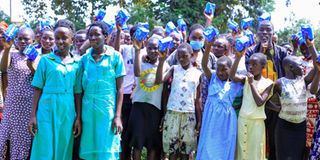Birungi fundraises for pads for vulnerable girls via social media

Beneficiaries in eastern Uganda display their packets of pads. Esther Birungi uses social media to rally support for vunerable girls. PHOTOS/ GABRIEL BUULE
What you need to know:
How she started...
I used my savings to make art works and graphics to boost the campaign and it was welcomed by many on social media, including politicians, business people and activists.
I want to be remembered for doing something bigger than myself and making a positive impact on the world. I want to make my life worth something, die a legend and make my family proud.
Esther Birungi subscibes to the words of Jessica Reyez, a Canadian singer and songwriter.
Unlike other initiatives, Esther Birungi’s approach is more pragmatic. She believes that lamenting and documenting problems that women face may take forever to provide urgent solutions.
Birungi rallies Ugandans on Twitter and Instagram to raise funds for pads for vulnerable girls under the hashtag #PadsThruCovid.
Birungi rallies Ugandans on Twitter and Instagram raise funds for pads for vulnerable girls under the popular hashtag #PadsThruCovid.
Birungi has reached out to more than 25 communities countrywide having moved to Kaliro , Luuka, Kamuli, Bushenyi among other areas in central , east and western Uganda.
“We need a solution-based approach to problems that women and girls face instead of lamenting. If women help women using resources within their reach, we would change more lives,” Birungi says.
Social media for pads
Current statistics show that internet penetration in Uganda is at 24 per cent as of January, with about 2.59 million Ugandans using social media.
Birungi says while some Ugandans use social media for noble causes and business, many use it for all the wrong reasons.
“Many young people are on social media for showbiz, gossiping and cyber bullying. A handful of them are using it to create change,” she adds
Birungi, a Law student at Uganda Christian University, is rooting for girls in vulnerable communities. She is using her 80.3 thousand followers to change the plight of the girl-child.
She often tweets about how a significant number of girls in Uganda cannot afford sanitary and fundraises money, and pads, which she delivers to communities together with her peers.
“I used my savings to make artwork and graphics to boost the campaign and it was welcomed by many on social media, including politicians, business people and activists,” she says.
She says from a project which started in early days of the lockdown, 5,000 packets of pads and money were collected and delivered to girls in Eastern Uganda.
“We visited three districts, one of them being Kamuli, where my role model, the Speaker of Parliament, Rebecca Kadaga, hails from. We also traversed Luuka and Kaliro districts. We met 210 girls, including teenage mothers,” she says.
Birungi says she has given out more than 10,000 sanitary pads and offered menstrual hygiene training sessions to a number of districts.
Why pads through Covid.
Birungi says for a very long time, activists have been advocating for free or subsidised sanitary towels.
She says after visiting a couple of districts in easten Uganda, she realised that girls in these communities needed more sanitary towels, especially those that live in camps .
“ What we have given out is just a drop in the ocean compared to millions of girls across the country who cannot access sanitary towels,” she says.
Birungi adds that in many communities, mothers are now forced to prioritise food, fuel and water over items such as pads, a crisis she says stakeholders should pay attention to.

Birungi reaches out to girls in Luuka District.
Statistics
According to a 2020 Unicef report on Mitigating the impacts of Covid-19 and menstrual health and hygiene, it is reported that an estimated 1.8 billion girls, women, and gender non-binary persons menstruate, yet millions of women across the world cannot manage their monthly cycle in a dignified, healthy way.
The Covid-19 pandemic will, however, have secondary impacts on girls’ and women’s ability to manage their menstruation and their health. The impacts will vary based on the country context and ability to respond through social protection and health systems.
Similarly, the most affected will be the poorest and most vulnerable to economic and social shocks. Certain occupations will bring greater vulnerability.
When he was canvassing for votes in 2015, President Museveni pledged to provide free sanitary pads to all primary girls, a pledge that never materialised.
Costs
Birungi says a packet of sanitary pads in Uganda costs between Shs 3,000 and Shs4,000. On average, a girl uses six packets in three months, depending of the magnitude of the flow, which is equivalent to nearly Shs24,000.
She adds that at a time when people are not working, it is extremely difficult for girls in vulnerable communities to access sanitary pads.
The big dream
Birungi plans to roll out this campaign countrywide. She wants to use her social media platforms to lobby stakeholders to ensure sanitary towels are declared essential goods and remain available to girls free of charge.
She says Uganda should buy into Unicef’s proposal to make menstruation-related supplies essential to send a clear message that “essential hygiene products are a priority for the health, dignity and welfare of all people”




